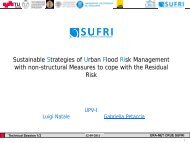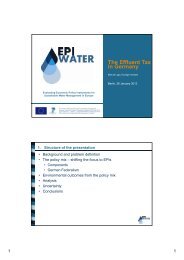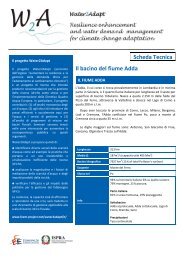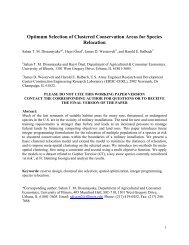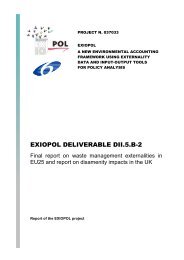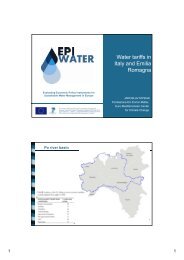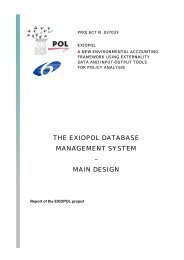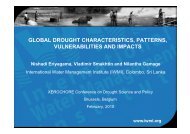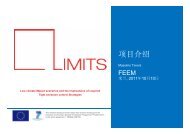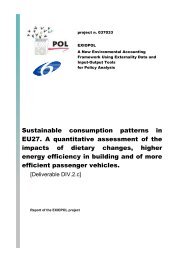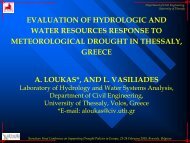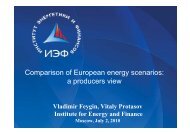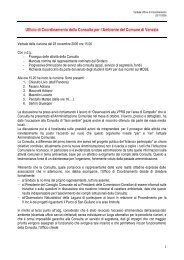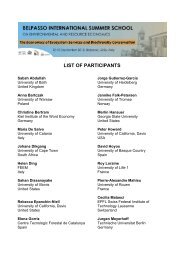Gulf and European Energy Supply Security - Feem-project.net
Gulf and European Energy Supply Security - Feem-project.net
Gulf and European Energy Supply Security - Feem-project.net
You also want an ePaper? Increase the reach of your titles
YUMPU automatically turns print PDFs into web optimized ePapers that Google loves.
<strong>Energy</strong> <strong>Security</strong>: Potential for EU-GCC Cooperation<br />
enforcement of the contracts. This can be seen<br />
as referring directly to the <strong>Energy</strong> Charter Treaty,<br />
designed to perform the mentioned tasks, but<br />
still not ratified by Russia.<br />
1.4 Resource Nationalism<br />
Every country in the world is indeed resource<br />
nationalist in the sense that it wants to harvest the<br />
most fruits out of its soil. The reality is that while in<br />
the past International Oil Companies (IOCs) could<br />
easily manage the rate of depletion of the fields<br />
they were operating <strong>and</strong> could easily prospect<br />
foreign territories, nowadays those prerogatives<br />
have fallen back in the h<strong>and</strong>s of the national<br />
governments.<br />
Some authors 7 have argued that the NOCs have<br />
different stakeholders from IOCs <strong>and</strong>, therefore,<br />
a different way of envisaging their activity. They<br />
play an important role in their domestic economies,<br />
need to satisfy actors other than international<br />
investors, <strong>and</strong> sometimes play the role of an<br />
instrument of foreign policy. The maximization of<br />
the benefits is consequently “one of the variables<br />
in the equation” <strong>and</strong> not the only one, which has<br />
led some to argue that NOCs take less efficient<br />
decisions than IOCs. This being said, the situation<br />
greatly varies depending on the country as each<br />
state has a specific attitude, some behaving in more<br />
efficient ways than others.<br />
Resource nationalism is not different from any<br />
other foreign policy issue; countries protect their<br />
interests, like they always have. For example, Saudi<br />
Arabia directs gas to the production of chemicals<br />
<strong>and</strong> uses this resource to propel the industrialization<br />
of the country; therefore, it has no intention to<br />
export gas. Can this be called resource nationalism?<br />
It is rather the logical expression of a development<br />
strategy. The EU will have to deal with this like it<br />
would any other issue of international economics;<br />
resource nationalism per se should not be considered<br />
as a cause for heightened concern.<br />
2.Risk Quantification by source<br />
As we have outlined the major geopolitical<br />
factors threatening the global natural gas industry,<br />
the discussion now needs to be focussed on the<br />
analysis of each major gas source so as to determine<br />
individual weaknesses <strong>and</strong> opportunities.<br />
2.1. Russia<br />
Russia is today the EU’s largest external supplier<br />
of natural gas with about 196 bcm exported in 2008. 8<br />
It is also the country possessing the largest reserves<br />
in the world (44.38 tcm), the second largest producer<br />
(527.5bcm) <strong>and</strong> the largest natural gas exporter.<br />
Russia has been a reliable partner for its main<br />
clients for decades, <strong>and</strong> it is likely to remain one in the<br />
future. Historical experience shows that even during<br />
periods of heightened tensions between the West<br />
<strong>and</strong> the Soviet Union, supplies were not cut. In the<br />
recent past, three unfortunate incidents involving<br />
Europe’s gas supplies occurred, which fuelled fears<br />
<strong>and</strong> motivated many to call for a reduction of the<br />
dependence on Russia <strong>and</strong> an increased quest for<br />
alternative sources, which led to the emergence of<br />
the Nabucco <strong>project</strong>. 9<br />
All Russian gas is exported by pipeline. This<br />
assures the customer at the end of the pipeline that<br />
the gas flow cannot be diverted easily <strong>and</strong> quickly.<br />
When political motivations are balanced by economic<br />
interests, the mutual dependence between Russia<br />
<strong>and</strong> the EU is a factor that limits, to a great extent,<br />
unilateral decisions. On the other h<strong>and</strong>, countries<br />
allowing the pipeline to go through their territories<br />
can exert pressure on either the producer or the<br />
customer. Therefore, Russia is a reliable partner over<br />
the long run, but can present significant risks in the<br />
short term, whether those risks are directly created<br />
by Russia or by third countries.<br />
Russian gas export routes all point in the<br />
direction of Europe <strong>and</strong> are concentrated in Ukraine.<br />
The Ukrainian problem has motivated Russia to find<br />
new routes to reach West <strong>European</strong> markets. Both<br />
the Nord Stream <strong>and</strong> South Stream <strong>project</strong>s follow<br />
this logic.<br />
The growing ties between Russia <strong>and</strong> China have<br />
been deemed to have the potential to divert gas<br />
flows away from Europe. Chinese energy needs have<br />
grown dramatically in the last few years, but the usage<br />
of natural gas remains relatively limited. However,<br />
several import <strong>project</strong>s have caught the attention<br />
of observers. For the small volumes imported until



